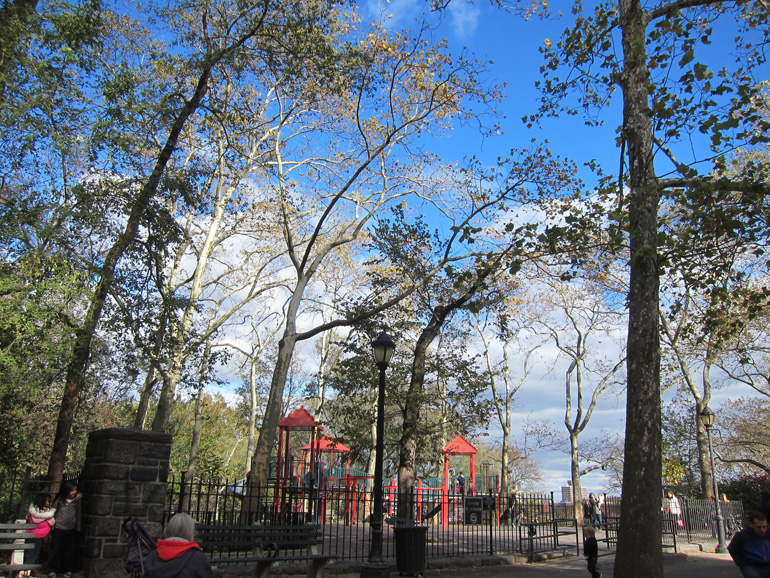Gotham Diary:
Pop-Up Refugees
5 November 2012
On Friday, when Megan and Ryan saw that the power company had affixed a sticker to the front door of their building, warning that power could not be restored to it until damaged equipment had been replaced, they decided to stop toughing it out in their cold flat. They loaded Will and Astor, along with several large backpacks, into a taxi, and headed uptown, reaching our place at 5:30 or so. No sooner did they get here than they went back downtown (leaving Will and Astor here with us) to fetch their bicycles, which they felt would be vulnerable to looters in the event of a lengthy absence, what with Con Ed’s sticker serving as an inadvertent invitation. When they got back, we sat down to a simple dinner of sirloin, rice and peas. A few chairs in the blue room were moved, and sleeping bags unrolled.Â
Who knew how long they’d be with us? We couldn’t think about it right away. And then it turned out not to be necessary. In the morning, Megan received a surprising email from her landlord, reporting that the damage had been worked around, and that the building had power and heat. So, after a breakfast of French toast and bacon, she and Ryan took their bikes downtown and spent the afternoon cleaning up the apartment. (There was also a semi-spontaneous local parade to cheer.) They came back for Will and Astor at dusk. Will was just waking up from a long nap, having run like a top through the playground at Carl Schurz Park. Ryan ordered some pizzas and, when we’d all had a few slices, Kathleen called for a car. The car service had no idea how long it would take to arrange — two hours, I was sure. But no! There must have been a driver loistering around the corner. Fortunately, no one had listened to my advice about taking their time packing up.
Yesterday, I tidied up the apartment as I would ordinarily do on a Saturday. I felt that I was straightening out not so much the slight disarray caused by the refugees but the emotional unsteadiness that lingered in Hurricane Sandy’s wake. I didn’t get rid of all of it by any means. Devastation and power outages remain widespread around the city, and although life appears to have gotten back to normal here in Yorkville, it is, quite palably, an appearance only.
There would be a lot less deprivation if more New Yorkers (and suburbanites) lived as we do — densely, on relatively high ground, in buildings powered by buried lines, and with no real need for automobiles. We’d be in even better shape (although we didn’t need it this time) if solar or wind power could be harnessed for the purpose of running our elevators and our water-tower pump.
Anyway, the fun’s not over. Another nor’easter is headed our way for Wednesday.
***
The first package to arrive after Sandy contained Nate Silver’s The Signal and the Noise, and Moments of Being, the collection of Virginia Woolf’s autobiographical writings. You would not think that these books have much in common, but at a fundamental level they do, because both are concerned with uncertainty, with coming to terms with uncertainty as intelligently and honestly as possible.
Nate Silver writes,
This probabilistic element of the Bayesian way may seem uncomfortable at first. Unless we grew up playing cards or other games of chance, we were probably not encouraged to think in this way. Mathematics classrooms spend more time on abstract subjects like geometry and calculus than they do on probability and statistics. In many walks of life, expressions of uncertainty are mistaken for admissions of weakness.
Virginia Woolf writes,
Here I come to one of the memoir writer’s difficulties — one of the reasons why, though I read so many, so many are failures. They leave out the person to whom things happened. The reason is that it is so difficult to describe any human being. So they say: “This is what happened”; but they do not say what the person was like to whom it happened. And the events mean very little unless we know first to whom they happened.
What both are saying is that we must live with approximations. We must resist the illusion of certainty. We must see overconfident bluster for what it is, and not permit ourselves to be falsely reassured. We must do as best we can, without any guarantees but the hope of our neighbors’ good will (founded upon our own).
You never know.

